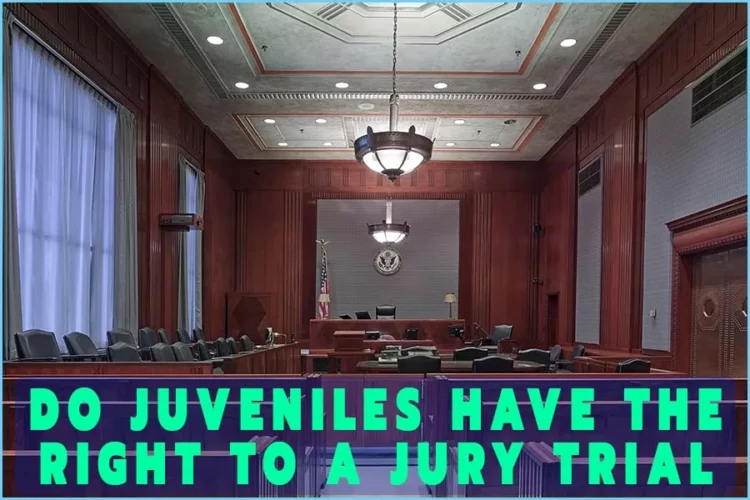The position of the law for juveniles in the U.S. criminal justice system seems weird. In some instances, the law treats juveniles as adults. In other scenarios, the law does otherwise. It treats them as juveniles.
Now, here’s the thing. When you ask lawyers if juveniles have the right to a jury trial, their answers will be “it depends.” In other words, several factors determine if a youngster would face jury trial or not.
Normally, the right to a jury trial belongs only to adults as far as the U.S. Constitution is concerned. But then, what happens to juveniles that commit serious crimes? Will they be let off the hook?
Now, let’s revisit the question below.
Do juveniles have the right to a jury trial?
No, juveniles don’t have the constitutional right to a jury trial in a juvenile court. That’s what the constitution states.
The Supreme Court’s wish is for juvenile jury trials not to actually take place. Why? The apex court’s reason is that utilizing juries will undermine juvenile court proceedings’ confidentiality.
The Supreme Court also believes juvenile court proceedings aren’t the same as proceedings in regular criminal court. Why? They’re not genuinely adversarial.
A juvenile court’s purpose shouldn’t be to punish juveniles but rehabilitate them. That’s the Supreme Court’s position.
However, the Supreme Court doesn’t stop or forbid states from conducting jury trials for juveniles. Most states do, though in cases that involve severe penalties.
Continue reading for more details on this subject.
Conditions Where Juveniles Can Have The Right To A Jury Trial
Constitutionally, juveniles don’t have the right to a jury trial. The constitution didn’t make provisions for that to happen. But there are cases where a minor can get a jury trial.
So, on what ground can a juvenile receive the right to a juvenile trial?
#1: When charged as an adult:
A very popular way juveniles can get jury trials is when charged as adults. And these can happen in two ways:
- If the charges against the youngster are serious. The offense might be murder or rape.
- Age is another factor. In this case, the alleged juvenile must be over 16 years.
However, keep in mind that most states boast statutory exclusion, preventing the trial of certain criminal offenses in juvenile courts.
#2: Judicial waiver:
A juvenile can be brought and tried in an adult court via a judicial waiver process.
Two things can make a juvenile court judge transfer a case from a juvenile to an adult court. The first is the offender’s (juvenile) criminal history. Another reason is the severity of the crime committed.
Furthermore, the court can take advantage of waivers for juveniles at a certain age. The age for a waiver also varies from one state to another.
Most states only allow a juvenile case transfer to adult court when the offender (juvenile) is 17 or 18 years of age. Some states permit it for younger defendants. These include juveniles 13 or 14 years old.
A Handy Tip: Juveniles can face trial as adults for offenses such as murder. But keep in mind that under the present law, juveniles’ punishment cannot include the death penalty.
Who A Juvenile Is
The maximum age for juveniles varies from state to state. Some states consider juveniles as individuals between the ages of 10 and 18. The maximum age for teenagers set by some states is 16 years.
So if an offender’s age is 17 years, they will be tried as an adult if the state’s maximum age for juveniles is 16 years.
Understand also that courts can try older juveniles when the crime committed is severe. These include cases of rape or murder.
What Is The Primary Goal Of Juvenile Sentencing?
In juvenile court rulings, the judge decides whether the accused juvenile is guilty or not. The judge also decides the nature of the sentence.
Now, here’s the thing. Regardless of the offense, judges must adhere to specific guidelines when delivering judgment on a juvenile case.
The judge must act in the juvenile’s best interest, regardless of the crime. Besides, the goal of juvenile sentencing isn’t to punish the kid.
For example, an adult guilty of murder may get a life sentence or other harsher punishments. In contrast, a juvenile that committed a similar crime may face rehabilitation.
The rationale behind rehabilitating juveniles is to nurture them to live a highly productive adult life. The judiciary system believes rehabilitation can help to shape juveniles into better individuals.
How To Tackle Juvenile Delinquency
The easiest way to stop crime is to raise healthy children. Parents need to raise mentally and emotionally sound children that recognize the need to shun crimes.
Why should we pay so much attention to kids? Well, kids are the future. They are leaders of tomorrow. When you raise kids in toxic environments, they may grow up to become monsters and commit heinous crimes in society.
So, yes, we can prevent juvenile delinquency, and here are ways to achieve that.
#1: Educate parents on how to raise healthy kids:
Early intervention is vital for preventing juvenile delinquency in the United States of America and worldwide.
Parents need to have information on how to raise kids sound in body and mind. But providing parents with the correct information is not enough. They must do well to participate in the training programs and put the information they get to good use.
#2: Let children know the consequences of their actions:
Children need to know every action has consequences. There are consequences for unprotected sex, drug abuse, gangs, fighting, weapons, etc.
Let children know how their actions can impact their lives and the lives of others around them. There should be no sugarcoating.
Kids may sit calmly and listen to teachings about the consequences of their actions. But that isn’t the case for most adults. Some may listen to teachings about good behavior, but it won’t change them.
Additionally, children need to know more about self-worth. They need to understand how unique they are. That way, peer pressure won’t have much effect on them.
#3: Organize recreational programs:
The Department of Education’s report on juvenile delinquency is insightful. They claimed that youths are more likely to commit crimes between 2 p.m. and 8 p.m., with 3 p.m. being the peak period.
However, parents and educators can help discourage youths from committing crimes via recreational programs. These programs can take the place of unsupervised after-school hours.
Most kids may use unsupervised after-school hours to nurture evil thoughts or engage in activities that pollute their mental state.
So the best approach is to fill those hours with activities that can help youths connect with people. It could be dancing activities, rock climbing, hiking, sports, music, bowling, drama, etc.
#4: Taking decisive actions against bullies:
Kids experiencing bullying are more likely to commit suicide. Many may also attempt suicide when facing such an ordeal.
It doesn’t matter whether its cyberbullying or at school, neighborhood or elsewhere; being bullied can have massive adverse effects on a child’s mental state.
So, schools should address kick against bullying. Kids that are bullied should go for counseling, and the ones bullying others should be made to understand the adverse effects of their actions.
Let’s not forget that kids that are bullied might grow up to become bullies too. We have to break this cycle and groom kids that are more tolerant.
Conclusion
So, do juveniles have the right to a jury trial? No, they don’t. The U.S. Constitution only recognized the right to a jury trial for adults.
However, there are cases where juveniles may face trial as adults. These include cases of severe crimes such as murder or rape.
The juvenile may be brought and tried in court via a judicial waiver. Age may also be a factor that decides whether a child will face a jury trial.
On the other hand, juvenile delinquencies are issues society can tackle. Parents and educators must devise means to help nurture healthy children.
When we raise healthy children, the crime rate may likely reduce. Those kids will grow up and become better citizens in society.










